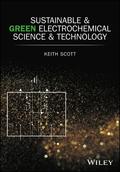Sustainable and Green Electrochemical Science and Technology

1. Edition July 2017
408 Pages, Hardcover
Wiley & Sons Ltd
Short Description
This book provides valuable insights into the wide scope of electrochemistry and gives details of the current status and its applications in industrial processes and consumer devices. It brings together the basic concepts of electrochemical science and engineering and shows how these are applied in an industrial context, emphasising the major role that electrochemistry plays within society and industry in providing cleaner, greener and more sustainable technologies. The book is targeted at both academic and industrial readers.
Sustainable and Green Electrochemical Science and Technology brings together the basic concepts of electrochemical science and engineering and shows how these are applied in an industrial context, emphasising the major role that electrochemistry plays within society and industry in providing cleaner, greener and more sustainable technologies. Electrochemistry has many applications for sustainability; it can be used to store energy, synthesise materials and chemicals, to generate power and to recycle valuable resources.
Coverage includes
* Electrochemistry, Electrocatalysis and Thermodynamics
* Electrochemical Cells, Materials and Reactors
* Carbon Dioxide Reduction and Electro-Organic Synthesis
* Hydrogen production and Water Electrolysis
* Inorganic Synthesis
* Electrochemical Energy Storage and Power Sources
* Electrochemical processes for recycling and resource recovery
* Fuel Cell Technologies
This book is targeted at both industrial and academic readers, providing a good technological reference base for electrochemistry. It will enable the reader to build on basic principles of electrochemistry, and takes these through to cell design for various and diverse applications.
Acknowledgement xv
1 Introduction to Electrochemical Sustainable Processes 1
1.1 Introduction 1
1.2 Effluent Treatment and Recycling 3
1.3 Green Electrochemistry 3
1.4 Electrochemistry and Energy Sustainability 4
1.5 Hydrogen Economy and Fuel Cells 7
1.6 Conclusions 24
References 25
2 Electrochemistry, Electrocatalysis and Thermodynamics 27
2.1 The Electrochemical Cell 27
2.2 Electrochemical Thermodynamics 29
2.3 Types of Electrochemical Reactions 38
2.4 Mass Transport and Electrochemical Reactions 49
2.5 Photoelectrochemistry 73
2.6 Electrochemical Impedance Spectroscopy 80
References 84
3 Electrochemical Cells, Materials and Reactors 87
3.1 Electrochemical Reactors 87
3.2 Fuel Cells 97
3.3 Batteries 101
3.4 Capacitors 103
3.5 Electrochemical Cell Engineering 106
References 124
4 Carbon Dioxide Reduction and Electro-Organic Synthesis 125
4.1 Electrochemical Reduction of Carbon Dioxide 125
4.2 Organic Synthesis 143
4.3 Green Electro-Organic Synthesis 151
4.4 Conclusions 156
References 157
5 Hydrogen Production andWater Electrolysis 159
5.1 Fossil Fuel Based Hydrogen Production 160
5.2 Hydrogen via Electrolysis 161
5.3 Photoelectrolysis 184
5.4 Thermal and Electrochemical Generation of Hydrogen fromWater 191
5.5 Chemical Production of Hydrogen 200
5.6 Conclusions 200
References 201
6 Inorganic Synthesis 203
6.1 Chemicals from the Electrolysis of Halides 203
6.2 Electrolytic Processes for Metal Processing 216
6.3 Inorganic Compounds and Salts 220
6.4 Generation of Chemical Oxidants 223
6.5 Conclusions 231
References 231
7 Electrochemical Energy Storage and Power Sources 233
7.1 Batteries 233
7.2 Supercapacitors 266
7.3 Biological Fuel Cells 271
References 287
8 Electrochemical Energy Systems and Power Sources: Fuel Cells 291
8.1 Introduction 291
8.2 Principle of Fuel Cell Operation 294
8.3 Fuel Cell Systems 296
8.4 Polymer Electrolyte Membrane Fuel Cells 300
8.5 Alkaline Fuel Cells 320
8.6 Medium and High Temperature Fuel Cells 326
8.7 Direct Alcohol Fuel Cells 344
8.8 Unitized Fuel Cells 356
References 359
9 Electrochemical Processes for Recycling and Resource Recovery 363
9.1 Electrochemical Membrane Separations 363
9.2 Electrochemical Oxidations 380
9.3 Recovery and Recycling of Dissolved Metals 381
References 383
Index 385


